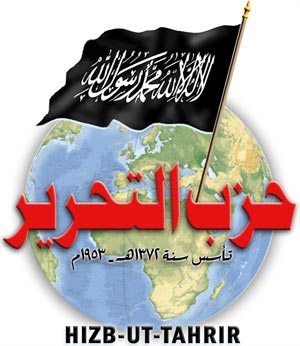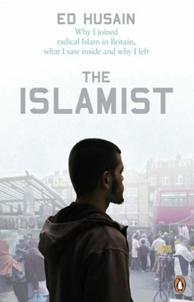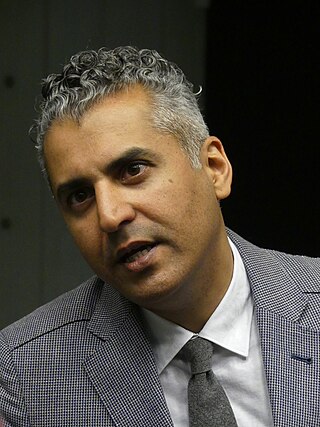Related Research Articles

The politics of Turkey take place in the framework of a constitutional republic and presidential system, with various levels and branches of power.

Hizb ut-Tahrir is an international pan-Islamist and Islamic fundamentalist political organization whose stated aim is the re-establishment of the Islamic caliphate to unite the Muslim community and implement sharia globally.
Akromiya is an Islamist organization founded by Akrom Yo‘ldoshev.
The Hood event refers to a 2003 military incident involving Turkey and the United States shortly after the American-led invasion of Iraq. On July 4, 2003, a group of Turkish soldiers operating in Iraqi Kurdistan were captured by American troops and, with hoods covering their heads, were led away to be interrogated. Afterwards, American soldiers raided a Turkish safehouse in Sulaymaniyah and seized 15 kilograms (33 lb) of explosives in addition to sniper rifles, grenades, and maps of Kirkuk with circles drawn around positions near the local governor's building. Turkey lodged a diplomatic protest with the United States, and the Turkish soldiers were then released after spending 60 hours in American custody. Turkey has been involved in a long-running conflict with the Kurds, and one Iraqi-Kurdish intelligence official claimed that the Turkish soldiers had been linked to a plot to assassinate the newly elected governor of Kirkuk in order to destabilize the region, opening the way for the Turkish military to intervene.
Hizb-an-Nusra is an Islamist organization which the Uzbek government considers to be terrorist in nature that has operated in Uzbekistan since 1999. It was founded by Mirzazhanov Atoyevich. Members of Hizb ut-Tahrir, an international organization dedicated to establishing a unified Islamic state across the Muslim world, created Hizb-an-Nusra in Tashkent out of dissatisfaction with Hizb ut-Tahrir's inability to overthrow the Government of Uzbekistan.
Prior to the 2001 invasion of Afghanistan, the Islamic Movement of Uzbekistan (IMU) posed the greatest threat to the Karimov administration. In 2002 the IMU was reclassified as terrorist by the United States. Since the invasion, the IMU has been greatly weakened due to US military actions which cut off its supply of resources and killed its leader, Juma Namangani.
Terrorism in Tajikistan stems largely from the forces of the political opposition who opposed the comprehensive peace agreement that ended the civil war in 1997. President Emomali Rahmonov and UTO leader Said Abdullah Nuri signed the agreement on 27 June, believing it would bring an end to hostilities. However, dissident Islamist militants led by Tohir Yo‘ldosh and Juma Namangani formed the Islamic Movement of Uzbekistan in 1998, allying with Al-Qaeda and vowing to unite Central Asia as an Islamic state. The latest terror attacks took place in the Qabodiyon District on November 6, 2019, when a policeman and a border guard were killed by several Islamic State militants. 15 terrorists were also killed.
Terrorism in Kyrgyzstan has increased since the U.S. military invaded Afghanistan and overthrew the Taliban in 2001. The governments of Kyrgyzstan and Uzbekistan provided airbases for counter-terrorism operations. Southern Kyrgyzstan is increasingly sympathetic to terrorism and Islamic extremism.
Igor Rotar is a Russian journalist. From 2003 to early 2007 he was the Central Asian news correspondent for Forum 18, a human rights organization based in Norway that promotes religious freedom. He is a Russian citizen.
The threat of terrorism in Kazakhstan plays an increasingly important role in relations with the United States which in 2006 were at an all-time high. Kazakhstan has taken Uzbekistan's place as the favored partner in Central Asia for both Russia and the United States. Kazakhstan's counter-terrorism efforts resulted in the country's 94th ranking among 130 countries in the 2016 Global Terrorism Index published by the Institute of Economics and Peace. The higher the position on the ranking is, the bigger the impact of terrorism in the country. Kazakhstan's 94th place puts it in a group of countries with the lowest impact of terrorism.
Wassim Doureihi is a prominent member of Hizb ut-Tahrir in Australia, a global Islamic political party that advocates the re-establishment of the Caliphate in the Muslim world. He is a spokesman for the organisation.

The Islamist: Why I Joined Radical Islam in Britain, What I Saw Inside and Why I Left is a 2007 book about Ed Husain's five years as an Islamist. The book has been described as "as much a memoir of personal struggle and inner growth as it is a report on a new type of extremism." Husain describes his book as explaining "the appeal of extremist thought, how fanatics penetrate Muslim communities and the truth behind their agenda of subverting the West and moderate Islam."

Maajid Usman Nawaz is a British activist and former radio presenter. He was the founding chairman of the think tank Quilliam. Until January 2022, he was the host of an LBC radio show on Saturdays and Sundays. Born in Southend-on-Sea, Essex, to a British Pakistani family, Nawaz is a former member of the Islamist group Hizb ut-Tahrir. His membership led to his December 2001 arrest in Egypt, where he remained imprisoned until 2006. While there, he read books about human rights and made contact with Amnesty International who adopted him as a prisoner of conscience. He left Hizb-ut-Tahrir in 2007, renounced his Islamist past, and called for a secular Islam. Later, Nawaz co-founded Quilliam with former Islamists, including Ed Husain.

Hizb ut-Tahrir America is a separate, but linked entity to the international pan-Islamist and fundamentalist organization that seeks to establish a global caliphate governed under Shariah law. Under this caliphate, members work toward uniting all Islamic countries as well as transforming secular, host countries into Islamic states. Hizb ut-Tahrir America's goals are the same as the global organization – the installation and implementation of sharia law as the sole source of law.
The fight against terrorisminAzerbaijan is one of Azerbaijan's declared priorities. International organizations banned as terrorist include Al Qaeda, Al-Nusra Front, Jamaat, Hizb ut-Tahrir, Islamic International Brigade, ISIS, Jeyshullah, and PKK. According to the Global Terrorism Database, seven people have been killed and over 20 injured in terrorist attacks from 2000 to 2015.

Hizb ut-Tahrir is an international pan-Islamist and fundamentalist political organisation. The organisation is considered a "radical Islamic group" and has come under scrutiny from the Australian government.
Shiraz Maher is a British writer and analyst, and Director at the International Centre for the Study of Radicalisation and Political Violence (ICSR) at King's College London. He also teaches at Johns Hopkins University. The son of Pakistani immigrants, for several years after 9/11 Maher was a member of the Islamist organisation Hizb ut-Tahrir, but left the movement after the 2005 London bombings and became an outspoken critic of radical Islam. He has written for leading newspapers in Britain and elsewhere, produced reports and studies on counterterrorism strategy, and appeared in the international news media as a commentator on jihad and radicalisation.

Hizb ut-Tahrir Britain is the official name of the United Kingdom branch of Hizb ut-Tahrir, a transnational, pan-Islamist and fundamentalist group that seeks to re-establish "the Islamic Khilafah (Caliphate)" as an Islamic "superstate" where Muslim-majority countries are unified and ruled under Islamic Shariah law, and which eventually expands globally to include non-Muslim states such as Britain. The group was designated a proscribed terrorist organization in the UK in January 2024.

Hizb ut-Tahrir is a pan-Islamist and fundamentalist group seeking to re-establish "the Islamic Khilafah (Caliphate)" as an Islamic "superstate" where Muslim-majority countries are unified and ruled under Islamic Shariah law, and which eventually expands globally to include non-Muslim states. In Central Asia, the party has expanded since the breakup of the Soviet Union in the early 1990s from a small group to "one of the most powerful organizations" operating in Central Asia. The region itself has been called "the primary battleground" for the party. Uzbekistan is "the hub" of Hizb ut-Tahrir's activities in Central Asia, while its "headquarters" is now reportedly in Kyrgyzstan.
Hizb ut-Tahrir in Bangladesh is a banned international Islamist organization.
References
- ↑ Zeyno Baran, Hudson Institute
- ↑ Kilic, Ecevit (2008-09-08). "Rusya'ya karşı Çin-ABD açılımı olabilir". Sabah (in Turkish). Retrieved 2009-01-04.
- ↑ O Brotherhood, What Art Thou?, The Weekly Standard
- 1 2 Hizb ut-Tahrir Islam's Political Insurgency Archived February 12, 2006, at the Wayback Machine The Nixon Center
- ↑ Hearing Transcript, United States Congress
- ↑ The Coming Coup d'etat?, Newsweek
- ↑ Mail Call, Newsweek
- ↑ Erdoğan'dan "felaket senaryosu" yorumu: "Deli saçması", Haber Aktüel
- ↑ Statement from Zeyno Baran on Hudson June 13 Meeting Archived September 29, 2007, at the Wayback Machine , Hudson Institute